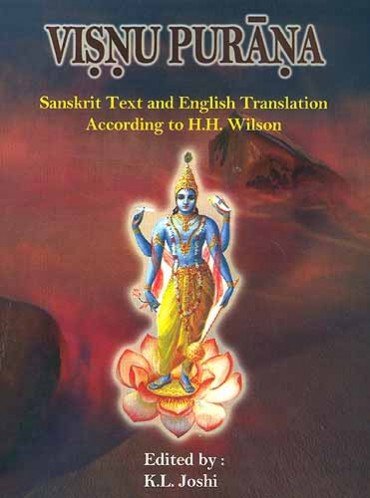The Vishnu Purana
by Horace Hayman Wilson | 1840 | 287,946 words | ISBN-10: 8171102127
The English translation of the Vishnu Purana. This is a primary sacred text of the Vaishnava branch of Hinduism. It is one of the eighteen greater Puranas, a branch of sacred Vedic literature which was first committed to writing during the first millennium of the common era. Like most of the other Puranas, this is a complete narrative from the cr...
Chapter XXI - Narration of the kings of the future periods
I WILL now enumerate the kings who, will reign in future periods[1]. The present monarch, Parīkṣit[2], will have four sons, Janamejaya, Śrutasena, Ugrasena, and Bhīmasena[3]. The son of Janamejaya will be Śatānīka[4], who will study the Vedas under Yājñyawalkya, and military science with Kripa; but becoming dissatisfied with sensual enjoyments, he will acquire spiritual knowledge from the instructions of Śaunaka, and ultimately obtain salvation. His son will be Aswamedhadatta (a son given by the gods in reward for the sacrifice of a horse[5]); his son will be Asīma-kṛṣṇa[6]; his son will be Nicakra[7], who will remove the capital to Kauśāmbī, in consequence of Hastināpura being washed away by the Ganges; his son will be Uṣṇa[8]; his son will be Citraratha; his son will be Vṛṣṇimat[9]; his son will be Susheṇa; his son will be Sunītha[10]; his son will be Rica[11]; his son will be Nricakṣu[12]; his son will be Sukhīhala[13]; his son will be Pariplava; his son will be Sunaya[14]; his son will be Medhāvin; his son will be Nripañjaya[15]; his son will be Mridu[16]; his son will be Tigma[17]; his son will be Vrihadratha; his son will be Vasudāna[18]; and his son will be another Śatānīka; his son will be Udayana[19]; his son will be Ahīnara[20]; his son will be Khaṇḍapāni[21]; his son will be Niramitra[22]; his son will be Kṣemaka[23]: of him this verse is recited; “The race which gave origin to Brahmans and Kṣatriyas, and which was purified by regal sages, terminated with Kṣemaka; in the Kali age[24].”
Footnotes and references:
[1]:
The style now adopted is that of prophecy, as Vyāsa could not consistently have recorded the events which were posterior to his time.
[2]:
Also read Parīkṣita, Parīkṣa, and Parīkṣi.
[3]:
See p. 457. The Vāyu and Matsya relate, rather obscurely, a dispute between Janamejaya and Vaiśampāyana, in consequence of the former's patronage of the Brahmans of the Vājasaneyi branch of the Yajur-veda, in opposition to the latter, who was the author of the black or original Yajush (see p. 279). Janamejaya twice performed the Aśvamedha according to the Vājasaneyi ritual, and established the Trisarvī, or use of certain texts by Aśmaka and others, by the Brahmans of Anga, and by those of the middle country. He perished however in consequence, being cursed by Vaiśampāyana. Before their disagreement, Vaiśampāyana related the Mahābhārata to Janamejaya. Mahābh., Adi Parvan.
[4]:
The reading of the text is rather, ‘his (Parīkṣit’s) other son will be Śatānīka;' but the commentator refers ‘his’ to Janamejaya. The Vāyu, Matsya, and Bhāgavata also make Śatānīka the son of Janamejaya. The Brāhma P. has a totally different series, or Parīkṣit, Sūryāpiḍa, Candrāpiḍa, Janamejaya, Satyakarṇa, Śvetakarṇa, Sukumāra, and Ajaśyāma.
[5]:
The Bhāgavata interposes Sahasrānīka. The Vrihatkathā has the same descent, but calls the son of Sahasrānīka, Udayana or Vatsa. The Bhāgavata has Aśvamedhaja.
[6]:
Adhisāma k.: Vāyu. Adhisoma k.: Matsya. The former states that the Vāyu P. was narrated in this king's reign, in the second year of a three years' sacrifice at Kurukṣetra.
[7]:
Nemicakra: Bhāgav. Vicakṣus: Matsya. They agree with the text as to the removal of the capital, and the cause.
[8]:
Ukta: Bhāg. Bhūrijyeṣṭha: Matsya.
[9]:
Suchidratna, Vāyu; Suchidrava, Mats.; Kaviratha, Bhāg.; is interposed between Citraratha and Vṛṣnīmat.
[10]:
Sutīrtha: Vāyu.
[11]:
Ruci: Vāyu. Omitted: Mats. and Bhāg.
[12]:
Citrākṣa: Vāyu.
[13]:
Sukhīnala: Bhāg.
[14]:
Sutapas: Mats.
[15]:
Purañjaya: Mats.
[16]:
Ūrva: Mats. Dūrva: Bhāg.
[17]:
Tigmātman: Mats. Timi: Bhāgavata.
[18]:
Sudāsa: Bhāg. Vasudāman: Mats.
[19]:
The Matsya coñcurs with the text (see above, note 5); the Bhāgavata has Durdamana.
[20]:
Vahīnara: Bhāg.
[21]:
Daṇḍapāni: Bhāg., Vāyu, Mats.
[22]:
Nimi: Bhāg.
[23]:
Kṣepaka: Vāyu.
[24]:
The same memorial verse is quoted in the Matsya and Vāyu P., preceded by one which states the number of princes twenty-five. The specification however, commencing with Śatānīka, is twenty-six or twenty-seven. The passage is, ###.
